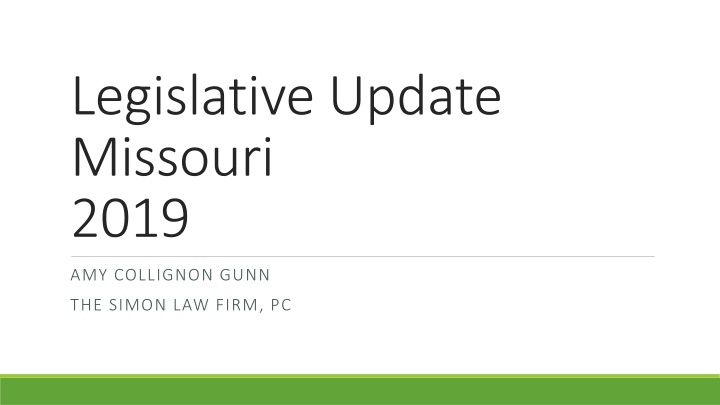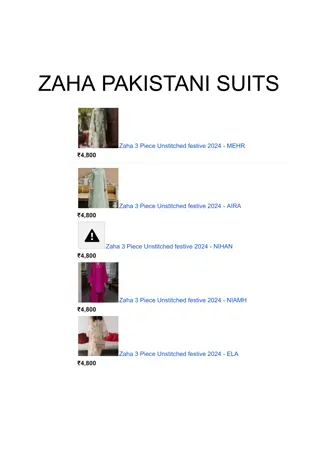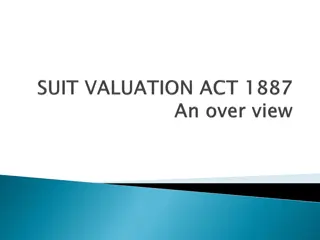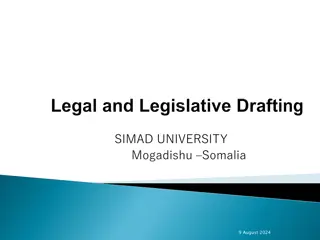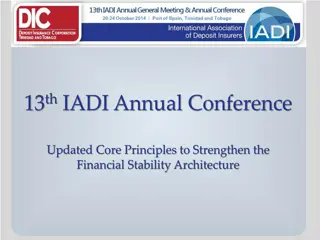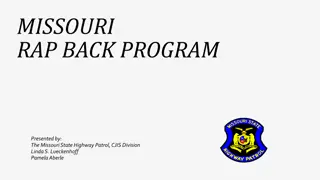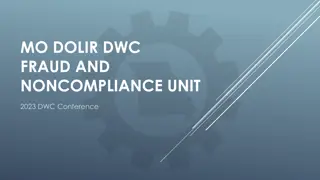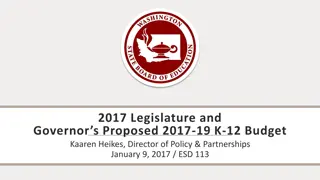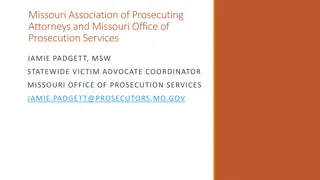Missouri Legislative Update 2019: New Rules for Suits Against Insurers
Missouri's legislative update in 2019 includes new rules for suits against insurers, focusing on venue determination and residency requirements. The changes aim to streamline processes and address historical challenges in insurance-related legal actions.
Download Presentation

Please find below an Image/Link to download the presentation.
The content on the website is provided AS IS for your information and personal use only. It may not be sold, licensed, or shared on other websites without obtaining consent from the author.If you encounter any issues during the download, it is possible that the publisher has removed the file from their server.
You are allowed to download the files provided on this website for personal or commercial use, subject to the condition that they are used lawfully. All files are the property of their respective owners.
The content on the website is provided AS IS for your information and personal use only. It may not be sold, licensed, or shared on other websites without obtaining consent from the author.
E N D
Presentation Transcript
Legislative Update Missouri 2019 AMY COLLIGNON GUNN THE SIMON LAW FIRM, PC
Truly Agreed To and Finally Passed Venue/Joinder (SB 7) Civil Procedure (SB 224) Seat Belts (SB 30) Real Estate Agent Immunity (SB 36)
SB 7-Application 507.040, 507.050, 508.010, 508.012, and 537.762 have all been repealed to be replaced with the new 375.1800, 375.1803, 375.1806, 507.040, 507.050, 508.010, 537.762 and Shall apply to any action filed after February 13, 2019, expect that a plaintiff who is a resident of Missouri and who has a case that is: 1) pending in a court of this state as of February 13, 2019; 2) has proper jurisdiction in this state; and 3) has a trial date, which was set before February 13, 2019 and will begin on or before August 28, 2019. Cases dismissed without prejudice for improper venue, but cannot be maintained in any other state as of August 28, 2019 due to SOL or savings statute issues may proceed in original venue.
SB-7 New Rules For Suits Against Insurers Insurers now reside only where they maintain their registered office (domestic), or registered agent (foreign), or in Cole County 375.1800 In all actions, tort or contract, under or arising out of an insurance contract, expressly including, breach of contract, bad faith, or breach of fiduciary duty, venue shall be in the county where the insurer resides or if the insured is a Missouri resident, then where the insured resided when the policy was issued. 375.1803 even if claim is assigned But, intervention under 537.065 will not affect venue of the pending action.
SB-7 New Rules For Suits Against Insurers 375.1803.2.1- These provisions do not apply to UM or UIM coverage claims, including enforcement of such coverage. 375.1803.2.2- Venue for vexatious refusal to pay UM or UIM, shall be governed by 375.1806, shall be determined as follows: 1) If accident occurred in MO, venue shall be county where accident occurred; 2) If accident occurred outside MO, either in: A) county where insurer resides, or B) If insured s principal residence is in MO on date of first injury, then that county.
Why new rules for insurers? State ex rel. Auto Owners Ins. Co. v. Messina, 331 S.W.3d 662, 663 (Mo. 2011). Prior to 1988, insurers resided in any county where they maintained an office or agent to conduct usual and customary business . The venue rules changed for other corporations in 2005, but insurers were left behind Section 351.375.2 provides that corporations reside where their registered office is, but Chapter 351 does not apply to insurance companies. Section 351.690(3). For tort actions involving insurers, determining the site of first injury proved a difficult concept for parties and courts. Loophole closed, presumably.
JOINDER SB 7 Section 507.040 R.S.Mo.1 Generally allows for joinder of all claims arising out of the same transaction, occurrence, or series of transactions or occurrences and if there is any common question of law or fact. What s new? Notwithstanding any other provision of law to the contrary, claims arising out of separate purchases of the same product or service, or separate incidents involving the same product or services shall not satisfy this section. 1. All references to Revised Statutes of Missouri, as amended.
SB 7 Johnson & Johnson case The legislature adopted and codified the holding of State ex rel. Johnson & Johnson v. Burlison, 567 S.W.3d 168 (Mo. 2019). Talc case, where several non-Missouri plaintiff s joined an action filed by Valerie Swann where she claimed she was first injured. Plaintiff s decedent was first injured in St. Louis County, but he joined a pending action in the City. The central issue in this case is whether permissive joinder of separate claims may extend venue to a county when, absent joinder, venue in that county would not otherwise be proper for each claim. It cannot and does not. State ex rel. Johnson & Johnson v. Burlison, 567 S.W.3d 168, 171 (Mo. 2019)
SB 7- Venue Details 508.010.1- For individuals, there is a rebuttable presumption that the county of voter registration at the time of injury is the principal place of residence. 508.010.2- For vicarious liability corporate cases, individuals residence shall be deemed to be the applicable corporation s principal place of residence. 508.010.3- For corporations, county where corporation has its registered agent is the principal place of residence. ONLY one principal place of residence. 508.010.15 - If the county where the plaintiff 's claim is filed is not a proper venue, that plaintiff shall be transferred to a county where proper venue can be established. If no such county exists in the state of Missouri, the claim shall be dismissed without prejudice. 508.010.16 - Denial of a motion to transfer venue if denied in error requires reversal, without any finding of prejudice. 508.012 If a new party or third party is added, removed, or severed prior to trial, who, if originally added, removed or severed from the initial petition would have altered venue the judge shall grant transfer upon application of any party.
VENUE Only one principal place of residence For individual there is a rebuttable presumption that they reside where the are registered to vote, unless There is even one count alleging they were acting in the course and scope of employment for a corporation, then they reside where corporation resides. When all defendants are non-residents, venue suit may be brought in any county, provided there is personal jurisdiction over each defendant, independent of each other defendant. (new)
Exceptions Venue rules do not apply to actions for uninsured or underinsured motorist coverage. If a Missouri accident, then venue is where the accident occurred. If the accident occurred outside of Missouri, then where the insurer resides, or if the insured was a Missouri resident, then where the insured resided on the date of the accident Also does not apply to vexatious refusal claim under Sections 375.296 and 375.420 attendant to uninsured or underinsured motorist claims.
SB 224-Civil Procedure SB 224 Amends The Supreme Court Rules Rule 56.01 now includes: express references to ESI, including specification of native format a proportionality provision as in federal court limitations for discovery that is cumulative, duplicative or can be obtained from another more convenient, less burdensome, or less expensive source rules directed at the burden and expense of producing ESI, but must be shown by shown on or in defense to a motion and the burden is on the party with the ESI a clawback provision for inadvertent disclosure of privileged material rogs and requests for admission limited to 25, including subparts depositions limited to 10 by each party 1 day of 7 hours But sanctions are available against any party who tries to run out the clock by impeding, delaying, or frustrating fair examination of a deponent
SB 30-Seat Belts SB30 (compromise) Modifies Section 307.178(4) Expert witness requirement 1% limitation Shall not apply to any action arising out of the design, construction, manufacture, distribution, or sale of a motor vehicle, if factory equipped with a safety belt Admissible to prove comparative fault, causation, absence of defect and failure to mitigate No expert requirement
SB 36-Real Estate Agent Immunity This act expands the immunity of real estate licensees to include information about the size or area of a property or of improvements to property if the information was from a third party and the source is disclosed by the licensee prior to an offer to purchase being transmitted to the seller. However, such licensee shall not have immunity if he or she knew the information was false, or acted with reckless disregard as to whether such information was true or false.
Other TATAFP bills SB 12 & 123- Currently, sheriffs receive $10 for service of any summons, writ, subpoena, or other court order, and that money is paid into the county treasury to the credit of the deputy sheriff salary supplementation fund. This act specifies that other persons specially appointed to serve orders of court shall also receive $10 for orders they serve, which shall also be paid into the county treasury to the credit of the deputy sheriff salary supplementation fund.
Other TATAFP bills SB 83-CHILD RELOCATION (Section 452.377) This act requires a party intending to relocate a child subject to a custody or visitation agreement to notify any other parties entitled to custody or visitation of their right to file a motion seeking an order to prevent the relocation and an accompanying affidavit setting forth the specific good faith factual basis for opposing the relocation within 30 days of receipt of the notice. GRANDPARENT VISITATION (Section 452.402) Under this act, a court may grant grandparent visitation if the grandparent has been unreasonably denied visitation for a period exceeding sixty days and one of several other scenarios has occurred. Except as otherwise provided, if the child's natural parents are legally married to each other and are living together with the child, a grandparent may not file for visitation. Before granting visitation, a court shall determine if such visitation would be in the child's best interests. This act repeals a provision of current law establishing a rebuttable presumption that married parents living with a child know what is in the best interests of the child.
Other TATAFP bills SB 297- This act allows a person who is 75 years of age or older to be excused from jury service on a petit or grand jury upon a timely application to the court.
Expect to see again Punitives Statute of Repose Bad Faith Asbestos MMPA Arbitration
Punitives HB 489 510.258. 1. Except as otherwise provided by statute, punitive damages shall not be 2 awarded unless the plaintiff proves by clear and convincing evidence that the defendant 3 intentionally harmed the plaintiff without just cause or acted with a deliberate and flagrant 4 disregard for the safety of others. No claim for punitive damages shall be based in whole 5 or in part on harm to nonparties.
Punitives 2. Punitive damages shall not be awarded against an employer or a principal because of the act or conduct of an employee or agent unless the plaintiff can satisfy the standard of proof under subsection 1 of this section and: (1) Prior to the act or conduct, the employer or principal expressly authorized the doing and manner of the act or conduct; (2) During or after the act or conduct, the employer or principal, with full knowledge of the doing and manner of the act or conduct, expressly ratified the act or conduct; or (3) The employee or agent was unfit to perform acts or duties of the kind for which a punitive damage award is sought, the employer or principal knew or had reason to know that the employee or agent was unfit to perform acts or duties of that kind, and the employer or principal expressly authorized the employee or agent to perform acts or duties of that kind.
Punitives 4. No initial pleading in a civil action shall contain a claim for punitive damages. Any later pleading containing a claim for punitive damages may be filed only with leave of the court. A trial court may grant leave to file such a pleading only on written motion by the plaintiff, filed no later than one hundred twenty days prior to the date set for trial. The motion shall be supported by evidence tending to establish a reasonable basis upon which a trier of fact could award punitive damages. Within thirty days of the filing of the motion, any party opposing it may file a response, including evidence tending to establish that there is no reasonable basis upon which a trier of fact could award punitive damages. The court shall grant the motion if it is determined that a reasonable basis exists upon which a trier of fact could award punitive damages. If the motion is not granted within forty-five days after its filing, the motion shall be deemed to have been denied by the court.
Punitives Any provision of law or court rule to the contrary notwithstanding, an award of punitive damages against a health care provider governed by the provisions of sections 538.205 to 538.230 shall be made only upon a [showing by a plaintiff] finding by the jury that the evidence clearly and convincingly demonstrated that the health care provider [demonstrated willful, wanton or malicious misconduct with respect to his actions which are found to have injured or caused or contributed to cause the damages claimed in the petition] intentionally harmed the plaintiff or demonstrated malicious misconduct that harmed the plaintiff. Evidence of negligence including, but not limited to, indifference to or conscious disregard for the safety of others shall not constitute a basis for an award of punitive damages against a health care provider.
Statute of Repose HB 186 516.099. 1. Any action to recover damages for economic loss, personal injury, property damage, or wrongful death arising out of a defe ctive or unsafe condition of any product that is sold, leased, or otherwise placed in the stream of commerce, or arising out of the negligent design, manufacture, sale, or distribution of any such product shall be commenced within fifteen years of the date on which such product is first sold or leased to any person or otherwise placed into the stream of commerce.
Statute of Repose Exceptions for: Knowing concealment of unsafe condition or defect Written warranty or advertisement for expected useful life exceeding 15 years Negligence service or maintenance Government Recall for consumer safety Latent respiratory disease
MMPA Currently, the court may award punitive damages as well as attorney's fees and equitable relief in actions for unlawful merchandising practices. This act repeals the availability of punitive damages and provides that the plaintiffs in a class action for unlawful merchandising practices may only seek to recover compensatory damages. Additionally, in a class action, a court may enjoin the practices declared to be unlawful and may determine an award of reasonable attorney's fees for counsel for the class. Such fees shall bear a reasonable relationship to the amount of the judgment. After the commencement of the class action, an order permitting the class action shall specify how the class claims and any issues affecting only individual members will be tried in a manageable, time efficient manner.
Arbitration SB 154 - This act provides that in an arbitration agreement between an employer and an employee the arbitrator shall make all initial decisions as to arbitrability, which includes deciding whether the parties have agreed to arbitrate, whether the arbitration agreement is enforceable, and whether specific claims are arbitrable. This provision shall not apply to arbitration agreements contained in a collective bargaining agreement. The arbitrator must be selected by mutual agreement of the parties or using a strike and ranking process when the parties cannot agree. The act establishes certain criteria for when the arbitrator shall determine that the arbitration agreement is valid. On motion by a party showing that the arbitration agreement does not expressly delegate the issue of arbitrability to the court, the court shall stay the action and order the parties to proceed to arbitration. Any clause in an arbitration agreement between an employer and an at-will employee that requires arbitration proceedings to be confidential and nondisclosable shall not be enforceable as to claims of sexual harassment, sexual assault, or claims of discrimination based on certain protected statuses.
